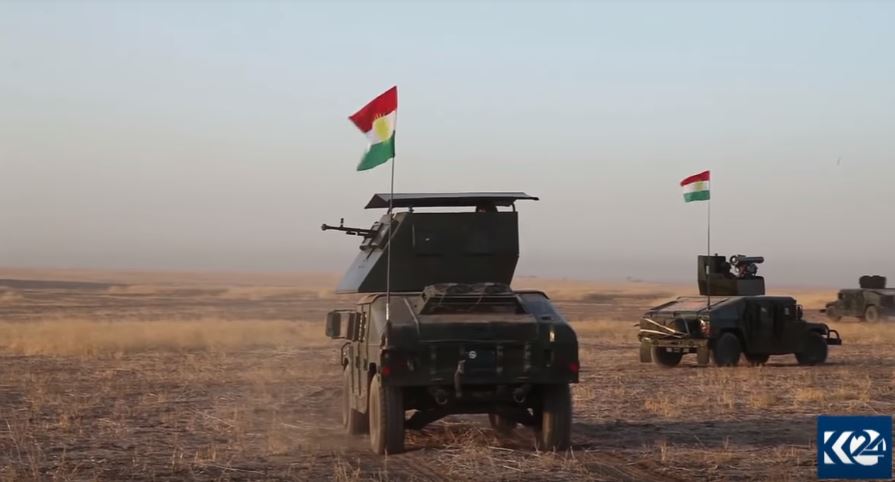Peshmerga's absence could lead to Kirkuk's swift downfall: official

ERBIL (Kurdistan 24) – Lapses in security in the disputed province of Kirkuk could lead to its swift fall should the Islamic State (IS) launch an attack, according to an official.
“The militants [threatening the area] are the same group of men who took over Mosul [Nineveh’s capital and Iraq’s second largest city] in a few hours,” Head of the Kirkuk Provincial Council (KPC), Rebwar Talabani, said during an interview with Kurdistan 24 on Sunday.
He warned that Kirkuk is “a much smaller target” which IS “tried to occupy with 200 men” back when they launched an attack in the heart of the city in Oct. 2016. The insurgent-style attack was thwarted by Peshmerga forces “with the help of local volunteers.”
Talabani, however, warned the current security situation is far different than what it was under the protection of the Kurdish Peshmerga.
“Fifty Daesh (IS) fighters could take the city,” right now, he asserted.
When IS emerged in 2014, the Kurdish Peshmerga forces stepped in to defend the city and province of Kirkuk after Iraq security forces collapsed and withdrew. Baghdad, at the time, asked the Kurdistan Regional Government (KRG) to send the Peshmerga into Kirkuk and other disputed areas to stop the violent spread of IS in northern Iraq.
Despite Iraqi and Kurdish security forces, supported by the US-led coalition, fighting side by side in the year leading up to IS’ defeat in Iraq, the Peshmerga were forced to withdraw from Kirkuk and other disputed territories in Oct. 2017 following an attack by Iranian-backed Shia militias and Iraqi forces. The assault, orchestrated in response to the Kurdistan Region’s referendum on independence, led to a breakdown of cooperation between the two security apparatus.
The sequence of events aroused suspicions among Kurdish politicians, among them Khalid Shwani, a member of the Patriotic Union of Kurdistan (PUK), who in an interview with Kurdistan 24 on Sunday claimed that IS’ presence in contested areas had been “part of a plan” by the Iraqi government to “weaken the Peshmerga’s position in the region.”
However, the rise in explosions, IS attacks and ambushes, and the overall deterioration of the security situation in Kirkuk has prompted many to request the Kurdish forces return.
Talabani pointed out that those who opposed to the Peshmerga’s presence in Kirkuk and other disputed territories “now admit, shamefully, that these areas will not see peace” as long as the Kurdish forces are prevented from resuming their work.
POLITICAL MANEUVERING
“Iraq has always been like this. Kurds must not forget the history of oppression under previous Iraqi governments. Whoever enters that position [Head of Iraq] uses the Kurds to strengthen their position and form a government.”
“They repeat their oppressive tactics, as they always have,” Talabani lamented, likening measures taken by the Iraqi authorities to previous regimes.
“It is naïve to think that the people who are in power now are in any way different from those that came before, from 1920 to 2003.”
“Now they [southern Iraqis] are fighting among themselves, struggling to form government fifty days after the election was held.”
Iraq held national elections on May 12, which were marred by allegations of fraud and calls for a recount or a redo. The Parliament conceded to a partial manual recount of paper ballots, but political parties still called for legal measures to address potential cases of fraud.
Among the Kurdish parties, tensions persist as some alleged electoral fraud was committed by the PUK in their stronghold of Sulaimani, raising concerns about a weakened Kurdish front in Baghdad.
Commenting on the political disunity plaguing the Kurdish parties, Talabani said Kurds “hope to come together again.”
Shwani, who also serves as an adviser and spokesperson to the Iraqi President, Fuad Masum, echoed the sentiment and noted the PUK had initiated talks with other Kurdish blocs, notably the Region’s largest party, the Kurdistan Democratic Party (KDP), in efforts to unite the parties in addressing the concerns of Kurds in disputed areas.
Editing by Nadia Riva
